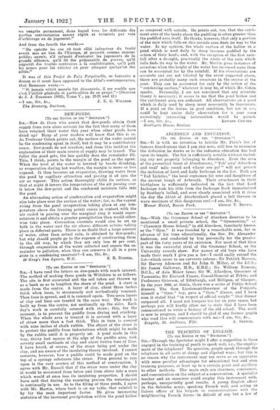DEW-PONDS.
[To THE EDITOR OF THE " SPECTATOR."] SIR,—How do those who assert that dew-ponds obtain their supply from rain alone account for the fact that •many of them have retained their water this year when other ponds have dried up? Many of your readers will know that this is so. As Professor Cohen points out, the surface of the water cannot be the condensing agent in itself, but it may be a contributory cause. Dew-ponds do not overflow, and from this incident the explanation of their main source of supply may be traced. The fuller the pond gets, the less quickly does the remainder fill. This, I think, points to the margin of the pond as -the agent. When the level of the water is lowered by beasts drinking, or evaporation during hot weather, the margin is more or less exposed. It then becomes an evaporator, drawing water from the pond by capillary attraction and passing it off into the air as vapour. This action thoroughly chills its surface, so that at night it lowers the temperature of the air passing over it below the dew-point and the condensed moisture falls into the pond.
An alternating action of condensation and evaporation might also take place over the surface of the water; for, as the vapour rising from the pond (evaporation taking place at any tem- perature above the freezing point) comes in contact with the air cooled in passing over the marginal ring it would super- saturate it and obtain a greater precipitation than would other- wise take place. Convection currents would also be set up both in the water and the air above; different actions taking place in different parts. There is no doubt that a large amount of water, other than actual rain, is obtained by dew-ponds; but why should people go to the expense of constructing them in the old way, by which they not only lose 40 per cent. through evaporation of the water collected and expose 'the re- mainder to pollution, when they can conserve it all in a pure state in a condensing reservoir ?—I am, Sir, &c..


































 Previous page
Previous page